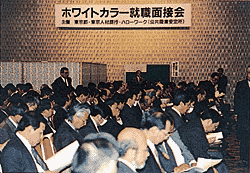|
| A. |
Private sector adjustment of labor supply-demand conditions |
In Japan, the Government's adjustment of labor supply-demand condition through the public Employment Security Offices is supplemented by private-sector activities carried out in regulatory framework protecting workers. In line with rapid changes both on the supply side and the demand side, there have been improvements on the systems relating to the private sector's adjustment of labor supply-demand conditions. In this way, efforts are being made to develop a situation in which labor supply-demand conditions are adjusted smoothly by joint efforts of the public and private sectors.
Private sector activities to adjust labor supply-demand conditions include the following:
1.Worker dispatching undertakings
Worker dispatching undertakings are governed by the Worker Dispatching Law (enforced in July 1986). A General Worker dispatching undertaking (see Note 1) requires permission, while a Specified Worker dispatching undertaking (see Note 2) requires notification. Workers may be sent out to engage in 26 types of expert services or work that needs special management, including information processing and financial processing. Also, various labor to be taken by dispatching firms and their clients have been decided on with an eye to stabilizing the workers' employment and to promoting their welfare.
2. Private employment placement projects
Private employment placement projects are divided into fee-charging services and free-of-charge services. Both of these may be offered only by those who have obtained the Labour Minister's permission (notification in the case of free-of-charge employment exchange services conducted by schools, etc.).
The fee-charging employment placement project, in accordance with the April 1, 1997 revision of the Law Governing Employment Exchange Services, may cover work types other than those that belong to the categories listed below.
| a. |
Manual laborer, except an expert and a technician, engaged in occupations of service |
| b. |
Security guard occupations |
| c. |
Manual laborer, engaged in occupations of agriculture, forestry and fisheries |
| d. |
Manual laborer, except an expert and a technician engaged in occupations of transportation and telecommunications |
| e. |
Skilled worker, except an expert and a technician, and manual laborer, except an expert and a technician, engaged in occupations of excavation, manufacturing, building and so on. |
These restrictions are not applicable to the placement of people who have graduated from school for less than one year in administrative jobs or sales jobs.
In addition, the previously approved 29 work types, including housekeepers, are still covered.
The free-of-charge employment exchange service is not subject to regulation with respect to the types of occupation, but this service mainly involves older workers, as well as nurses and other medical treatment-related workers.
3. Labor supply projects
Labor supply projects are prohibited except in cases where trade unions or other organizations conduct the service free-of-charge, after obtaining the Labour Minister's permission.
4. Labor recruitment
Labor recruitment is divided into recruitment by written materials, direct recruitment by employers and commissioning of recruitment. For the purpose of protecting workers, notification is required in case direct recruitment by employers is made in areas outside a zone that allows commuting. For commissioning of recruitment, permission is granted only in cases where the proprietor of a smaller firm that belongs to an organization established under the relevant law recruits workers through that organization.
| B. |
"Hello Work" links people with jobs |
| 1. |
Employment exchange service by the Public Employment Security Offices |
There are approximately 600 Employment Security Offices in Japan (called "Hello Work"), including branch offices. Their basic function is to adjust labor supply and demand by referring job seekers to jobs that best suit their wishes and abilities, and by referring to employers the most qualified workers.
The Public Employment Security Offices across the county are linked on-line with each other and conduct various services, using the Overall Employment Information (OEIS) that immediately provides a computerized network information on job offerings and job seekers. This system, which can be used at the nearest Public Employment Security Office, allows information on job offers and job seekers to be obtained throughout Japan, so it helps to eliminate imbalances among different regions. We will continue our efforts to attain employment security by strengthening the Public Employment Security Offices' functions of employment exchange and provision of employment information, and by strengthening their role as providers of comprehensive services with respect to their areas' employment and occupations.
In order to make appropriate responses to diverse needs, we conduct the following employment exchange services as well:
| a. |
Talent Bank
The Talent Bank conducts employment exchange services in cases of managers and technical experts, in order to send competent personnel to small and medium enterprises, and to promote employment of the elderly. There are a total of 26 Talent Banks in Tokyo, Osaka and other major cities in Japan (as of the end of FY1998).
|

Talent Bank |

Job Interview Fair for White Collars |
| b. |
Public Employment Security Offices to Assist Harmonization of Working Lives with Family Lives
Women's Public Employment Security Offices (dealing with what is called "Hello Work") have, since FY1999, been changed into Public Employment Security Offices to Assist Harmonization of Working Lives with Family Lives. They provide assistance for female workers who are capable and willing to work, but remain jobless because of the burdens of child care, family care and housekeeping. There are 12 such offices throughout Japan that try to help harmonize these family responsibilities with working lives. |
| c. |
Part-time Workers' Banks and Mini Part-time Workers' Banks
Part-time Workers' Banks and Mini Part-time Workers' Banks have been established at large city railway stations and other convenient locations, to provide comprehensive part-time employment exchange services. There are a total of 85 Part-time Workers' Banks located in cities with populations of over 200,000, and there are 95 Part-time Workers' Mini Banks in cities with populations of over 100,000 (as of the end of FY1998). |
| d. |
Student Employment Centers
This type of center supplies job offer information to those who will soon graduate from a university or other schools, and provides them with vocational guidance. Student Employment Centers have been established in six locations: Hokkaido, Miyagi, Tokyo, Aichi, Osaka and Fukuoka, and the other 41 prefectures have Student Employment Consultation Offices.
|
| 2. |
Measures to promote employment of new graduates |
Finding a job is an important turning point in life for new graduates. It is also very important from the viewpoint of securing human resources. For students who are to graduate from junior or senior high schools, employment security organizations provide occupational consultation and job placement services in cooperation with the schools. For students slated to graduate from a university or college, the university or college gives occupational guidance and conducts job placement services.
In promoting employment of new graduates, the following assistance is provided to deal with recent difficult employment circumstances:
| a. |
Strengthened collaboration with educational organizations (holding seminars for teachers in charge of job placement, etc.) |
| b. |
Provision of job information from companies, job consultation and other assistance at Student Employment Centers and Student Employment Consultation Offices |
| c. |
Securing job offers by seeking new job offered. |
| d. |
Holding job interview meetings |
To prevent negative effects on school education by early screening of potential graduates and to establish order in job offers and job applications, we have fixed a date for the commencement of screening for each year's junior high school graduates and senior high school graduates. For universities and colleges, there is no longer an Employment Agreement. This was abolished in FY1997. However, efforts are being made to maintain order in the job offer and job application process by, for example, having the Public Employment Security Offices cooperate with requests of universities, and by relying on the moral and orderly conduct of enterprises themselves.
We are assisting unemployed graduates to get jobs by providing good counseling and information about job offers.
|

